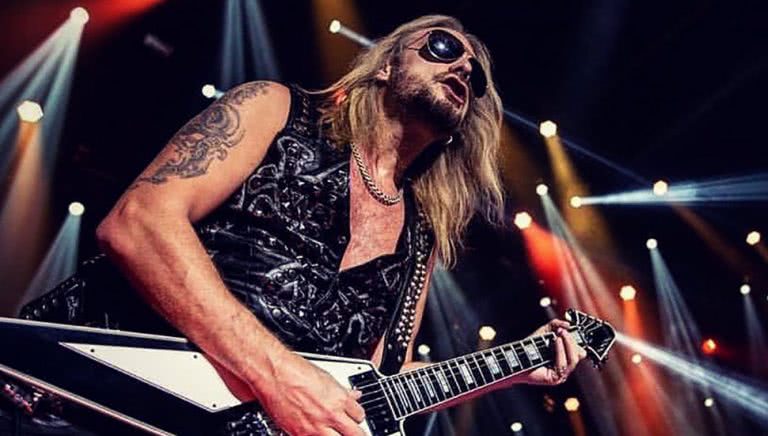Judas Priest guitarist Richie Faulkner has never shied away from being brutally real — onstage or off.
In a new interview with Premier Guitar, he laid bare the full extent of his recent health battles, revealing he suffered a stroke that’s left lasting damage to his brain and impacted the way he plays his instrument.
Faulkner, who famously survived an aortic aneurysm mid-set during a 2021 festival show in Kentucky, said the story didn’t end there.
A year later, he noticed things weren’t quite right with his right hand — the hand that fuels the fire of his ferocious playing. Not just on stage, but doing simple daily tasks like brushing his teeth.
That’s when he decided to get checked out. The initial diagnosis of a Transient Ischaemic Attack (TIA) turned out to be incorrect — scans revealed it had actually been a full-blown stroke.
“They found some damage on the left side of the brain, which affects the right side [of my body],” Faulkner explained. “Now, fortunately, I don’t play guitar with my foot, so that’s fine. I can get away with that. But my hand, obviously, that’s our engine room. And everything started clicking into place in regards to what I was feeling on stage.”
He continued, “They found the damage. They said that the fact that it hasn’t gone away means that it’s not a TIA; it’s a stroke. TIA damage can go away. Stroke — that’s it. It is damaged.”
Love Music?
Get your daily dose of metal, rock, indie, pop, and everything else in between.
The revelation came alongside yet another health scare — Faulkner also had to undergo open-heart surgery once again, this time to fix a leak in his heart. “You’ve got damage in your brain,” he said. “Now I thought I had brain damage before, but this is real. It’s a small thing on the left side.”
Despite the gravity of it all, Faulkner has kept playing — albeit with a new internal battle. The physical symptoms have been one thing, but it’s the mental toll that’s hit just as hard.
Faulkner admitted that he worried fans would be able to tell he was unable to play the band’s songs correctly, and he felt a lot of “fear” and “felt like a fraud” about how his condition might affect him.
“I just thought if I kind of free that up, if I make that accessible, then the truth is the truth. You can’t argue the truth,” he said. “I still play, we’re still writing records, we’re still playing as hard as we can — it doesn’t affect that — but there’s just little things I have to do.”
But there are nights where it all feels like too much. “Sometimes I come off stage and I call home and I say, ‘I can’t fucking do it. I can’t do it. I can’t do it.’”
He’s still got the chops, but the seamless connection between brain and fingers has changed. “There’s stuff that I used to play: I used to think something, and it would come out. And now I’m up there struggling to play like a rhythm pattern,” Faulkner admitted. “I can’t do it. I can’t. I’m gonna quit. I can’t do it. And then you have a good one. So who wants that? But that’s the way it is. That’s the truth. So that’s what I struggle with. That’s the collateral damage.”
Not long after his initial cardiac episode in 2021, Faulkner’s doctor, Siddharth Pahwa, credited his survival to little more than sheer luck. “Mr. Faulkner is alive today because the stars aligned,” Dr. Pahwa said at the time. “He had an outstanding emergency care team, he was close to a world-class heart centre, and he was quick to recognise he needed help.”
Watch the interview below:


































